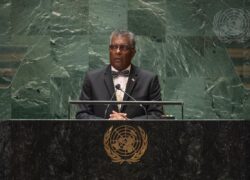
By Deandre Williamson
United Nations RAF Fellow
New York, N.Y. – The Bahamas will not accept “no” as an answer on climate change and
reparations, according to Minister of Foreign Affairs Fred Mitchell.
As he addressed the 78 th United Nations General Assembly on Friday, Mitchell said, “The
Bahamas wants the world to know that whether on reparations for slavery or on climate change,
‘no’ is not the correct answer.”
Climate change is the number one foreign policy issue for The Bahamas and it poses an
existential threat to the country and Caribbean region. In addition, The Bahamas has been
negotiating for climate reparations for loss and damage for more than 30 years.
Therefore, Mitchell said, “We must use our collective voices to reject the gospel according to no.
So long as we have our voices we will pass our message to the next generation and so on until
we succeed and justice is served.”
Climate justice fights for solutions to the climate crisis that would result in reduced emissions
and industrialized rich nations sharing the burden of the crisis by helping Small Island
Developing States (SIDS), like The Bahamas, handle the severe effects of climate change.
During his address, Mitchell noted that he was shocked to hear a developed nation partner’s
position on climate reparations for loss and damage by his country.
“Their response was that under no circumstances would there be reparations for the loss and
damage from climate change,” Mitchell said, adding that it begs the question of how much are
the lives of approximately 400,000 Bahamians worth.
SIDS are hit hardest by the impact of climate change are the least responsible. SIDS together
bear next to no responsibility for climate change, but their geographical, socioeconomic and
climate profiles make them particularly vulnerable to its impacts.
Hurricanes, floods and extreme heat are the impacts of climate change that are occurring in The
Bahamas. Therefore, countries emitting high levels of carbon are responsible for the climate
crisis and should be held accountable.
In addition, the country responsible for the slave trade should be held accountable for
reparations. During the slavery era, millions of African people were ripped from the continent of
Africa brought to the west and worked for free for 200 years. In the British Empire, they were
called freed in 1834, and worked for another four years in an apprenticeship scheme for free.
According to Mitchell, “The British government paid 20 million pounds to the slavers for the
loss of their property. That was then 40 forty percent of the national budget of the United
Kingdom. This is 17 billion pounds in today’s monies and we are advised that the bonds were
just paid off in the year 2015. Yet not one penny was paid to the slaves or to their descendants.
And not even an apology is being offered for the moral tragedy which slavery represents.”
“So ‘no’ to reparations on climate damage and ‘no’ to reparations on slavery. No over and over
again,” he said.
Mitchell noted that the generation of leaders that came before him did not accept no.
“That is why we are freer today than we were a generation ago, and they were freer than the
generation before them,” he added.
“When Michael Manley, the Jamaican prime minister stood at this podium after his historic
victory at the polls in 1972 and demanded a New International Economic Order, his call for
economic and social justice did not succeed, but it has been taken up by his successors who
continue this call throughout the Caribbean.
“Mr. Manley was taking up the call by Marcus Garvey of Jamaica and Robert Love of The
Bahamas from the generation before Mr. Manley. And Marcus Garvey was taking up the calls of
W.E.B. Dubois and James Weldon Johnson of Bahamian roots before him. Lynden Pindling did
not accept no when the Nassau Accords were forged to say let Nelson Mandela go. Cleary then,
‘no’ is not an acceptable answer to an unfree people. We in this generation take up the call: for
Brave Davis and The Bahamas no is not an acceptable answer.”


